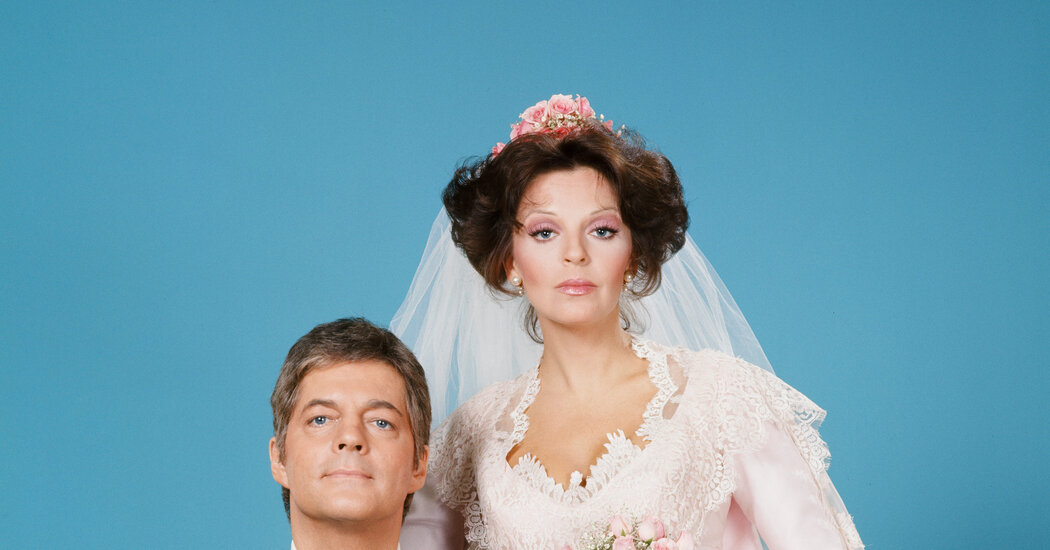Bill Hayes, an actor and singer whose 2,141 episodes of “Days of Our Lives” over five and a half decades constituted the daytime drama version of an ultramarathon, and whose top-selling 1955 single, “The Ballad of Davy Crockett,” remains seared into the memories of the baby boom generation, died on Jan. 12 at his home in Studio City, Calif. He was 98.
His wife and longtime co-star, Susan Seaforth Hayes, confirmed his death.
To soap opera fans, Mr. Hayes was a staple of weekday afternoons from the days of rabbit-ear antennas into the streaming era.
He began his tenure on the long-running NBC show in 1970. His character, Doug Williams, was a suave and slippery con artist who, after leaving prison, found himself padding through the maze of the plot twists, double-crosses and big reveals that day after day drew viewers back to the fictional Midwestern town of Salem.
While his character would eventually abandon his antisocial ways and become a pillar of the community, Mr. Hayes had fun in the early days playing a man with a past.
“You never knew if he was helping a lady across the street and being nice or unhooking her brassiere as they went across the street,” he was quoted as saying of his character in the book “Days of Our Lives: A Complete History of the Long-Running Soap Opera,” by Maureen Russell.
The plot point that really got things humming was Doug’s romance with Julie Olson, a beautiful young troublemaker played by Susan Seaforth, his future wife. They would soon became a soap-world power couple, both onscreen and off.
The couple married in real life in 1974, and their characters followed suit two years later, in an episode that drew 16 million viewers. It also drew thousands of fans to the show’s studio in Burbank, Calif., to greet them.
Such was their reach that in 1976 the couple, in their onscreen guise, even appeared on the cover of Time magazine, with the tagline “Soap Operas: Sex and Suffering in the Afternoon.”
“It was the script that brought the couple together,” the article said. “Emotionally exhausted from a messy divorce that left him to care for five teenage children, Bill arrived on ‘Days’ in 1970 looking only for a friend.” (Mr. Hayes and his first wife, Mary, had divorced in 1969).
“But then,” Ms. Seaforth said in the interview, “we started to do love scenes. That was just about the ballgame.”
The couple also formed a touring nightclub act, and Time noted that they were “mobbed when they appear in public,” with Mr. Hayes in particular being showered with attention from female fans.
“They treat me as if I were Robert Redford,” he said.
William Foster Hayes III was born on June 5, 1925, in Harvey, Ill., near Chicago. He was the second of three sons of Betty (Mitchell) Hayes, a schoolteacher, and William Foster Hayes II, an executive at World Book, the encyclopedia company.
Growing up listening to his father sing baritone with a vocal quartet, Bill aspired to be a singer himself.
After graduating from Thornton Township High School in 1942, he enrolled at DePauw University, in Greencastle, Ind. With World War II raging, he enlisted in the Navy and trained as a fighter pilot, although the war ended before he could be called for active duty.
He returned to DePauw and graduated with a liberal arts degree in 1947. He later earned a master’s degree in music from Northwestern University.
Turning his sights to show business, Mr. Hayes made his mark onstage in a national tour of the musical “Carousel” and on Broadway in the Rodgers and Hammerstein musical “Me and Juliet,” among other productions. In 1949, he made his debut on television, then in its infancy, as a singer on “Fireball Fun for All,” an NBC variety show hosted by the longtime vaudeville act Ole Olsen and Chic Johnson.
In the early 1950s, Mr. Hayes was seen on “Your Show of Shows,” the variety show featuring Sid Caesar and Imogene Coca.
But it was a television program that he did not appear on that provided him the opportunity for a hit record. In 1954, Disney sparked a youth craze with its “Davy Crockett” serial, with the TV frontiersman’s trademark coonskin cap becoming a must-have for children.
After seeing the show, the record producer Archie Bleyer decided that its theme song, sung by a vocal group, had potential as a stand-alone single for a solo performer.
“He called me up and said come by, I have a song,” Mr. Hayes recounted in “World by the Tail: The Bill Hayes Story,” a 2017 documentary about his life that he produced with his grandson Dave Samuel. “We met that night at 10 o’clock in an RCA recording studio, we did one take — one track, one take. It was a hit record.”
The song became the best-selling single in the country for five weeks, starting in March 1955. Davymania apparently knew no bounds: The show’s star, Fess Parker, and the singer Tennessee Ernie Ford would both score hit singles with interpretations of their own.
In addition to his wife, Mr. Hayes is survived by his daughters Carolyn Huff and Margaret Jackson; his sons, Thomas and William Foster Hayes IV; 13 grandchildren; and 30 great-grandchildren. His daughter Catherine died in 2010.
Over the years, Mr. Hayes popped up on other television shows, including “Matlock” and “Frasier.” He and his wife taped their final scene together on “Days of our Lives” just weeks before he died.
“The last scene I got to play with him is about how much we love each other,” Ms. Seaforth-Hayes said in a phone interview, “and I was blessed with an opportunity to hover over the words ‘Have I ever told you how much I love you?’ And Doug answers, ‘No, you never did.’ That was something Billy and I would say frequently in life.”
